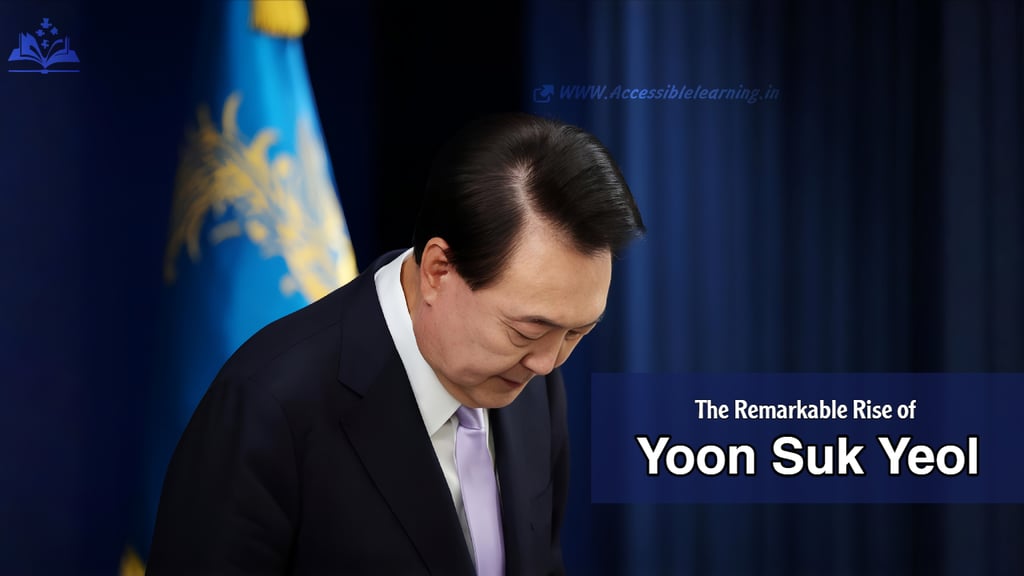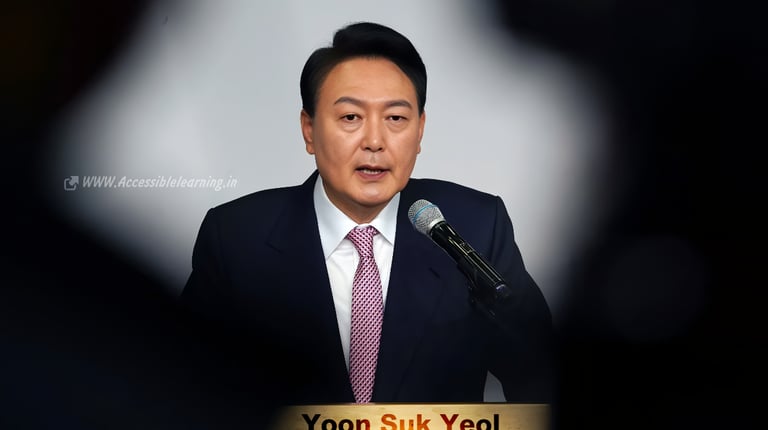
Yoon Suk Yeol: South Korea's Transformative Leader
Explore the transformative presidency of Yoon Suk Yeol, from his early career as a prosecutor to his groundbreaking foreign policy initiatives and domestic reforms. This comprehensive analysis examines how his leadership is reshaping South Korea's position on the global stage while addressing critical domestic challenges.
SOUTH KOREAPOLITICAL JOURNEYBIOGRAPHYENTREPRENEUR/BUSINESSMAN
Kim Shin
4/22/202511 min read


Yoon Suk Yeol, South Korea's President since May 2022, has established himself as a pivotal figure in East Asian politics. Rising from his role as prosecutor general to the nation's highest office, Yoon's leadership has been characterized by significant domestic policy shifts and a recalibration of South Korea's international relationships. This article examines his background, political journey, key policies, and the impact of his presidency on South Korea's position in the global arena.
Early Life and Career
Born on December 18, 1960, in Seoul, Yoon Suk Yeol grew up during a transformative period in South Korean history. His father, Yoon Ki-joong, was an accomplished academic who taught statistics at Yonsei University. This academic environment influenced Yoon's approach to education and analytical thinking from an early age.
Yoon attended Seoul National University, where he earned his law degree in 1983. During his university years, he participated in pro-democracy demonstrations against the authoritarian Chun Doo-hwan regime, reflecting early signs of his commitment to democratic principles.
After graduating, Yoon prepared rigorously for the bar exam, passing it in 1991 on his ninth attempt—a testament to his perseverance and determination. This experience shaped his character and demonstrated the tenacity that would later define his professional career.
His professional journey began in 1994 when he joined the prosecutor's office. Over the next two decades, Yoon built a reputation as a principled prosecutor willing to pursue justice regardless of political implications. His determination and integrity became evident during several high-profile corruption investigations, including cases involving former presidents and powerful corporate entities.
Notable Prosecutorial Achievements
Throughout his career as a prosecutor, Yoon handled several landmark cases that consolidated his reputation as a fearless pursuer of justice:
In 2006, he led an investigation into illegal political slush funds, showcasing his willingness to investigate powerful political figures.
In 2013, Yoon investigated allegations of election manipulation by the National Intelligence Service during the 2012 presidential election, demonstrating his readiness to confront governmental agencies.
Perhaps most notably, Yoon played a central role in the prosecution of Samsung heir Lee Jae-yong and former President Park Geun-hye in a massive corruption scandal that led to Park's impeachment in 2017.
These high-profile cases established Yoon as a prosecutor who prioritized legal principles over political considerations, a reputation that would later appeal to voters seeking integrity in government.
Rise to Political Prominence
Yoon's transition from prosecutor to political figure occurred through an unexpected pathway. In 2017, then-President Moon Jae-in appointed Yoon as Prosecutor General, recognizing his reputation for independence and commitment to anti-corruption efforts. Initially, this appointment was celebrated across the political spectrum as a move toward more accountable governance.
However, this professional relationship eventually deteriorated as Yoon pursued investigations that implicated figures connected to the Moon administration, including Justice Minister Cho Kuk. The investigation into Cho and his family for alleged academic fraud and financial improprieties created significant tension between Yoon and the Moon administration.
The administration's subsequent attempts to reform the prosecutor's office were viewed by many as efforts to curtail Yoon's authority. This struggle culminated in his effective demotion and eventual resignation in March 2021, after which he announced his presidential candidacy.
Despite being a political newcomer without traditional party experience, Yoon secured the nomination of the conservative People Power Party in a highly competitive primary process. His campaign focused on economic revitalization, addressing housing affordability, and strengthening international alliances, particularly with the United States.
The 2022 Presidential Election
The 2022 presidential election was one of the most closely contested in South Korean history. Yoon faced Democratic Party candidate Lee Jae-myung in a race characterized by personal attacks and minimal policy differences on many key issues.
Yoon's campaign emphasized anti-corruption, economic growth through deregulation, and a stronger stance toward North Korea. He also promised to address the housing crisis and growing economic inequality that had worsened during the COVID-19 pandemic.
The election reflected South Korea's deep political polarization, with Yoon ultimately winning by a margin of less than 1% (48.56% to Lee's 47.83%). This narrow victory highlighted the divided nature of the electorate and foreshadowed the challenges Yoon would face in governing with limited political capital.


Presidency and Key Policies
Since taking office in May 2022, President Yoon has implemented several significant policy initiatives across economic, foreign policy, and domestic governance domains.
Economic Approach
Yoon inherited economic challenges, including inflation, housing affordability issues, and the aftermath of pandemic-related disruptions. His administration has emphasized deregulation and market-oriented solutions, believing that reducing government intervention would stimulate economic growth and innovation. This approach marks a departure from his predecessor's more interventionist economic policies.
Specific economic initiatives have included
The "Corporate Vitality Enhancement Policy" aimed at reducing regulations on businesses and promoting investment.
Reforms to the capital gains tax structure to encourage investment in the Korean stock market.
The "New Market-led Innovation Strategy" focuses on emerging technologies such as semiconductors, biotechnology, and artificial intelligence.
Efforts to address the housing crisis through increased supply rather than price controls, including plans to build 2.5 million new housing units during his term.
The Yoon administration has particularly focused on fostering technological innovation, supporting semiconductor manufacturing, and positioning South Korea as a leader in emerging technologies such as artificial intelligence and clean energy.
Comprehensive Energy Policy Shift
A significant aspect of Yoon's economic policy has been his reversal of the previous administration's nuclear phase-out plan. Recognizing nuclear energy's importance for both energy security and carbon reduction goals, Yoon has revitalized South Korea's nuclear industry with several key initiatives:
Resuming construction on previously suspended nuclear plants
Extending the operational lifespan of existing reactors
Aggressively pursuing international nuclear power plant contracts
Investing in small modular reactor (SMR) technology
This policy shift represents both an economic strategy—leveraging South Korea's advanced nuclear technology for export—and an environmental approach that acknowledges nuclear energy's role in achieving carbon neutrality.
Foreign Policy Realignment
One of the most notable aspects of Yoon's presidency has been the recalibration of South Korea's international relationships. He has strengthened the alliance with the United States while carefully managing relations with China, South Korea's largest trading partner. This balancing act reflects the complex geopolitical realities of Northeast Asia.
Key elements of Yoon's foreign policy include:
The "Global Pivotal State" doctrine, which envisions South Korea as a pivotal middle power with global influence extending beyond regional concerns.
The Korea-U.S. Comprehensive Strategic Alliance, reinforced during President Biden's visit to Seoul in May 2022, expanded cooperation beyond traditional security concerns to include economic security, technology, and supply chain resilience.
The "Audacious Initiative" offered to North Korea, which proposes economic benefits in exchange for denuclearization steps—though Pyongyang has thus far rejected the proposal.
The Indo-Pacific Strategy, which aligns with U.S.-led efforts to maintain a "free and open Indo-Pacific" while attempting to avoid explicitly antagonizing China.
Regarding North Korea, Yoon has adopted a more assertive stance than his predecessor, emphasizing the importance of denuclearization before significant economic engagement. This approach has been accompanied by increased defense cooperation with the United States and Japan.
Historical Japan-South Korea Reconciliation
The improvement in South Korea-Japan relations deserves special mention. After years of strained ties over historical issues, particularly related to Japan's colonial rule of Korea (1910-1945), Yoon has pursued reconciliation with Japan, recognizing the strategic importance of cooperation between these democratic neighbors in the face of regional challenges.
In March 2023, Yoon took the politically risky step of announcing a resolution to the dispute over compensation for Korean forced laborers during the colonial period. Rather than insisting on direct payments from Japanese companies, the plan established a foundation funded by Korean companies to compensate victims.
This diplomatic breakthrough was followed by a landmark summit between Yoon and Japanese Prime Minister Fumio Kishida, the first formal bilateral summit between the countries' leaders in 12 years. The renewed relationship has facilitated trilateral cooperation with the United States on security issues and economic initiatives.
Domestic Governance and Social Issues
On the domestic front, Yoon has faced criticism for his handling of gender equality issues and labor relations. His decision to abolish the Ministry of Gender Equality and Family generated significant controversy, with supporters viewing it as streamlining government and critics seeing it as a regression in gender policy.
His administration has also confronted several challenging social issues:
The Itaewon Halloween crowd crush in October 2022, which resulted in 159 deaths, became a significant crisis for the administration. Criticism of the government's disaster response and subsequent investigation negatively impacted Yoon's approval ratings.
Labor disputes have increased during Yoon's tenure, with his administration taking a more employer-friendly approach than its predecessor. The truckers' strike in 2022 and ongoing disputes with medical professionals over healthcare reform have presented significant challenges.
Efforts to address South Korea's demographic crisis, including the world's lowest fertility rate, have been a priority. Yoon's administration has implemented expanded childcare subsidies and housing support for young families, though critics argue these measures are insufficient to address the root causes of the problem.
Additionally, his administration has implemented reforms in education, attempting to address competitive pressures in the education system while maintaining South Korea's academic standards. These include efforts to reform the university entrance examination system and increase opportunities for vocational training.


Digital Transformation Initiatives
President Yoon has positioned digital transformation as a cornerstone of his administration's economic strategy. Recognizing South Korea's existing strengths in digital infrastructure and technology, his government has launched several ambitious initiatives:
The "Digital Platform Government" project, which aims to transform government services through AI and data integration, making them more accessible and responsive to citizens' needs.
The "K-Digital New Deal 2.0," which expands on the previous administration's digital initiatives with greater emphasis on AI development, metaverse applications, and digital transformation of traditional industries.
Significant investments in semiconductor manufacturing capacity, including tax incentives and subsidies for the development of next-generation chips, are securing South Korea's position in this strategically important industry.
Creation of the "Digital Innovation Fund" to support startups and scale-ups in emerging technology sectors.
These digital initiatives reflect Yoon's vision of South Korea as a leading digital economy and technological innovator in the global marketplace.
Leadership Style and Public Perception
Yoon's leadership style reflects his background as a prosecutor rather than a career politician. He tends to be direct and focused on procedural correctness, sometimes at the expense of political nuance. This approach has garnered both admirers who appreciate his straightforwardness and critics who find his style lacking in diplomatic finesse.
His communication style has occasionally created controversies, including hot-mic incidents and statements requiring clarification by his office. These communication challenges have sometimes overshadowed policy accomplishments and contributed to periods of low approval ratings.
Public perception of Yoon has fluctuated throughout his presidency. Early approval ratings declined amid concerns about economic management and personnel appointments. His ratings reached historical lows during his first year in office, at times falling below 30%. However, his administration has seen periods of increased support, particularly following diplomatic achievements such as the Japan reconciliation and economic initiatives that resonated with the public.
Yoon's relationship with the media has been contentious at times, with his administration restricting access to the presidential office for some journalists and facing criticism for perceived attempts to influence media coverage.
Legislative Challenges and Political Environment
A significant constraint on Yoon's governance has been his party's minority status in the National Assembly. Throughout most of his presidency, the opposition Democratic Party has maintained a legislative majority, limiting his ability to pass legislation without compromise.
This political configuration has forced Yoon to rely heavily on executive actions rather than legislative solutions for many of his policy initiatives. It has also resulted in several high-profile conflicts between the executive and legislative branches, including
Multiple impeachment attempts against cabinet members
Parliamentary investigations of the administration
Vetoes of opposition-sponsored legislation
The polarized political environment reflects broader social divisions in South Korea, with significant generational, regional, and ideological differences shaping public opinion and political alignment.
International Impact and Regional Significance
President Yoon's influence extends beyond South Korea's borders. His emphasis on trilateral cooperation between South Korea, Japan, and the United States has contributed to a strengthening of democratic alliances in the Indo-Pacific region. This realignment has implications for regional security architecture and economic cooperation networks.
The Camp David Summit in August 2023 marked a historic moment in trilateral relations, establishing regular meetings between the leaders of South Korea, Japan, and the United States and formalizing cooperation on security issues, economic security, and emerging technologies.
South Korea under Yoon has also taken steps to expand its diplomatic footprint globally, seeking to elevate the country's status from a regional to a global player. This includes increased participation in international forums and expanded economic partnerships with countries beyond East Asia.
Specific international initiatives have included
The "Korea-ASEAN Solidarity Initiative," which seeks to deepen South Korea's engagement with Southeast Asian nations.
The "Korea-Africa Partnership," focusing on development cooperation and economic opportunities on the African continent.
Enhanced relationships with European partners, particularly in areas of technological cooperation and security.
Expanded participation in international institutions and multilateral initiatives, including climate change efforts and global health initiatives.
Military Modernization and Defense Policy
Under Yoon's leadership, South Korea has accelerated its military modernization program in response to evolving regional threats. Key aspects of this modernization include:
The "Three-Axis System" is designed to counter North Korean threats and consists of the Kill Chain preemptive strike system, Korea Air and Missile Defense (KAMD), and the Korea Massive Punishment and Retaliation (KMPR) plan.
Expanded research and development of advanced weapons systems, including indigenous fighter jets, submarines, and missile technology.
Increased defense spending, with the budget growing at a rate exceeding GDP growth.
Enhanced joint military exercises with the United States, reversing the previous administration's scaling back of such drills.
Development of space-based military capabilities, including military reconnaissance satellites.
This military modernization reflects Yoon's commitment to maintaining South Korea's security in an increasingly complex regional environment while also enhancing the country's defense industrial base as an engine of economic growth.


Challenges and Future Prospects
Despite his accomplishments, Yoon faces numerous challenges. Domestically, political polarization remains intense, with the opposition controlling the National Assembly for much of his term. This has limited his ability to implement legislative priorities and necessitated governance through executive action.
Key challenges include:
Managing inflation and economic uncertainty while implementing structural reforms.
Addressing the demographic crisis of low birth rates and rapid aging, which threatens long-term economic sustainability.
Navigating the increasingly complex U.S.-China competition, which creates difficult tradeoffs between security and economic interests.
Maintaining momentum in Japan-South Korea reconciliation despite persistent historical sensitivities.
Responding to North Korea's continued nuclear and missile development, which presents an ongoing security threat.
Implementing climate change commitments while ensuring energy security and economic competitiveness.
The future success of Yoon's presidency will likely depend on his ability to deliver tangible economic improvements for ordinary citizens while maintaining strategic flexibility in an uncertain geopolitical environment. His ability to build broader political consensus domestically will also be crucial for implementing his more ambitious policy goals.
President Yoon Suk Yeol represents a distinctive chapter in South Korea's political evolution. His transition from prosecutor to president brought a different perspective to governance, characterized by pragmatism and principle. While his leadership has generated both strong support and opposition, his impact on South Korea's international positioning and economic direction is undeniable.
As South Korea continues to navigate complex domestic and international challenges, Yoon's legacy will ultimately be determined by his ability to translate his vision into sustainable improvements in the lives of South Korean citizens and enhanced security and prosperity for the nation. His presidency reflects the ongoing maturation of South Korean democracy, where power transitions between ideologically different administrations occur peacefully, even as political polarization creates governance challenges.
Through his emphasis on strengthening alliances, promoting technological innovation, and pursuing market-oriented economic policies, Yoon is attempting to position South Korea for success in an increasingly competitive and uncertain global environment. Whether this vision will be fully realized remains to be seen, but his presidency has already marked a significant shift in South Korea's domestic and international trajectory.
Subscribe To Our Newsletter
All © Copyright reserved by Accessible-Learning Hub
| Terms & Conditions
Knowledge is power. Learn with Us. 📚


